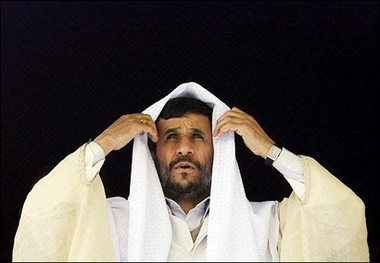Iran leader softens his tone on Iraq
(AP)Updated: 2007-02-13 08:33
TEHRAN, Iran - Iran's hard-line president, who has berated the United States and refused to compromise on his nuclear program, is now softening his tone, saying Monday he wants dialogue rather than confrontation in Iraq. Tehran also denied it gave sophisticated weapons to militants to attack US forces.
 Iranian President Mahmoud Ahmadinejad puts on an Arab outfit during a public meeting January 2007 in the southwestern city of Sousangerd. [AFP]  |
"We shy away from any kind of conflict, any kind of bloodshed," Ahmadinejad told ABC's "Good Morning America." "As we have said repeatedly, we think that the world problems can be solved through dialogue, through the use of logic and a sense of friendship. There is no need for the use of force."
Known for his inflammatory anti-Western rhetoric, Ahmadinejad in recent weeks has taken a milder approach to diplomacy. The change in tone comes at a time when domestic criticism of the controversial leader has increased, with both reformers and fellow conservatives complaining that Ahmadinejad spends too much time criticizing the United States and Israel, and not enough on internal issues such as Iran's struggling economy.
At the same time, the US appears to be hardening its accusations against Iran, including claims that the highest levels of the Iranian leadership armed Shiites in Iraq with sophisticated armor-piercing roadside bombs that have killed more than 170 troops from the US-led coalition.
Iran on Monday staunchly denied the accusations, comparing them to Washington's allegations before the 2003 US-led invasion of Iraq that Saddam Hussein's regime possessed weapons of mass destruction. No such weapons were ever found.
"Such accusations cannot be relied upon or be presented as evidence. The United States has a long history in fabricating evidence. Such charges are unacceptable," Foreign Ministry spokesman Mohammad Ali Hosseini said in Tehran.
The White House on Monday did not back down from its allegations, saying it was confident the report about the weapons flow from Iran to Iraq was accurate.
"This is providing - presenting evidence to the effect that there's been the shipment of weaponry, lethal weaponry into Iraq, some of it of Iranian providence," White House spokesman Tony Snow said. "And this is something that we think if the president of Iran wants to put a stop to it, we wish him luck and hope he'll do it real soon."
But Ahmadinejad dismissed the allegations as "pieces of paper" that don't prove the claims, emphasizing instead that Iran's security was dependent on Iraq's stability.
"Our position regarding Iraq is very clear. We are asking for peace. We're asking for security. And we will be sad to see people get killed, no matter who they are," he said.
Ahmadinejad, who was elected more than a year ago, has
focused much of his diplomacy on verbally attacking the US and Israel. In
December, he hosted a conference that questioned whether the Nazi Holocaust took
place and has called for Israel to be "wiped off the map."
| 1 | 2 |  |
|
||
|
||
|
|

